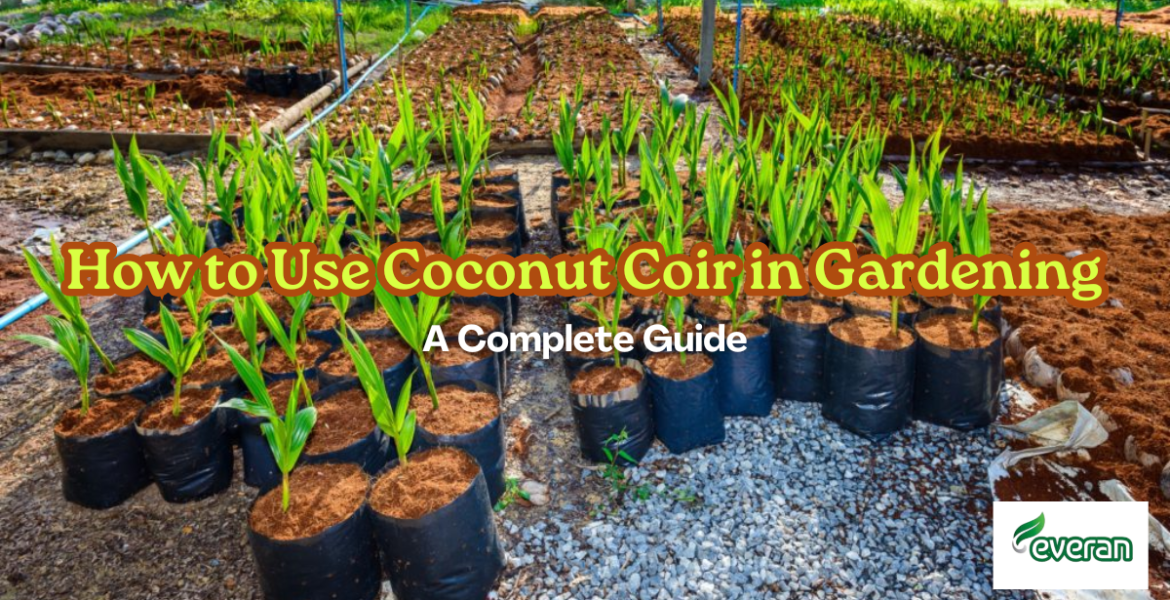If you’re looking for an eco-friendly and effective way to improve your garden, coconut coir is one of the best choices you can make. Made from the fibrous husks of coconuts, this natural material is quickly becoming a favorite among gardeners across the USA. It’s sustainable, versatile, and can be used in almost every type of garden—from raised beds and containers to seed starting and hydroponics.
In this guide, we’ll explain what coconut coir is, how to prepare it, and the different ways you can use it in gardening.
What Is Coconut Coir?
Coconut coir, often called coco coir, is the fiber extracted from coconut husks. Once cleaned and processed, it becomes a spongy, soil-like material. It’s usually sold in blocks, bricks, chips, or loose bags. To use it, you hydrate it with water until it expands into a fluffy growing medium.
Unlike traditional soil, coconut coir is lightweight, airy, and eco-friendly, making it a great alternative to peat moss or synthetic options.
Preparing Coconut Coir for Gardening
Before using coconut coir in your garden, you’ll need to prepare it:
-
Hydrate the Coir Block – Place the dry coir block or brick in a large container. Add water slowly and allow it to expand. One small block can yield several gallons of fluffy coir once hydrated.
-
Break It Apart – Once it softens, use your hands or a garden tool to break it into an even, soil-like texture.
-
Check pH Levels – Coconut coir has a naturally neutral pH of around 5.5–6.8, which works well for most plants. If you’re growing specific crops, you may want to test and adjust as needed.
-
Add Nutrients – Unlike soil, coir doesn’t contain natural nutrients. You’ll need to mix in compost, organic fertilizer, or a nutrient solution depending on your gardening style.
Ways to Use Coconut Coir in Gardening
Coconut coir is incredibly versatile. Here are the most common and effective ways to use it in your garden:
1. Seed Starting
Coco coir is soft, fine, and holds moisture well, making it perfect for starting seeds. Fill trays or pots with hydrated coir, plant your seeds, and keep them moist until germination. The coir helps seedlings grow strong roots and transplant easily.
2. Soil Amendment
If your garden soil is too heavy, clay-like, or sandy, mix coconut coir into it. Coir improves aeration, drainage, and water retention, creating a healthier soil structure for your plants.
3. Container Gardening
For indoor and outdoor pots, coco coir works as a lightweight alternative to heavy soil. Mix it with compost or perlite for extra nutrition and drainage. It prevents compaction, which helps roots spread out.
4. Raised Beds
Adding coconut coir to raised beds improves moisture management. It holds water during hot summers while still allowing excess water to drain away, reducing the risk of root rot.
5. Hydroponics
Coco coir hydroponics is a popular growing medium in hydroponic systems. It’s sterile, reusable, and provides excellent support for root development. Just be sure to add a balanced nutrient solution, since coir itself is nutrient-free.
6. Mulching
Spread a layer of coir on top of soil as mulch. It helps lock in moisture, prevent weeds, and regulate soil temperature—all important for healthy plant growth.
7. Pet- and Kid-Friendly Gardens
Since coconut coir is natural and chemical-free, it’s safe for family gardens where kids and pets love to play.
Benefits of Using Coconut Coir
-
Eco-friendly alternative to peat moss
-
Excellent water retention without waterlogging
-
Improves soil aeration for stronger root growth
-
Reusable for multiple growing cycles
-
Safe and natural, ideal for organic gardens
Final Thoughts
Coconut coir is more than just a growing medium—it’s a sustainable solution for modern gardening. From seed starting and raised beds to hydroponics and container gardens, coco coir can be used in almost every setup.
At Factory’s Deport, we supply premium-grade coconut coir products across the USA to help you grow healthier plants while making eco-friendly choices. Whether you’re a beginner or an experienced gardener, coconut coir makes gardening easier, safer, and more rewarding.

